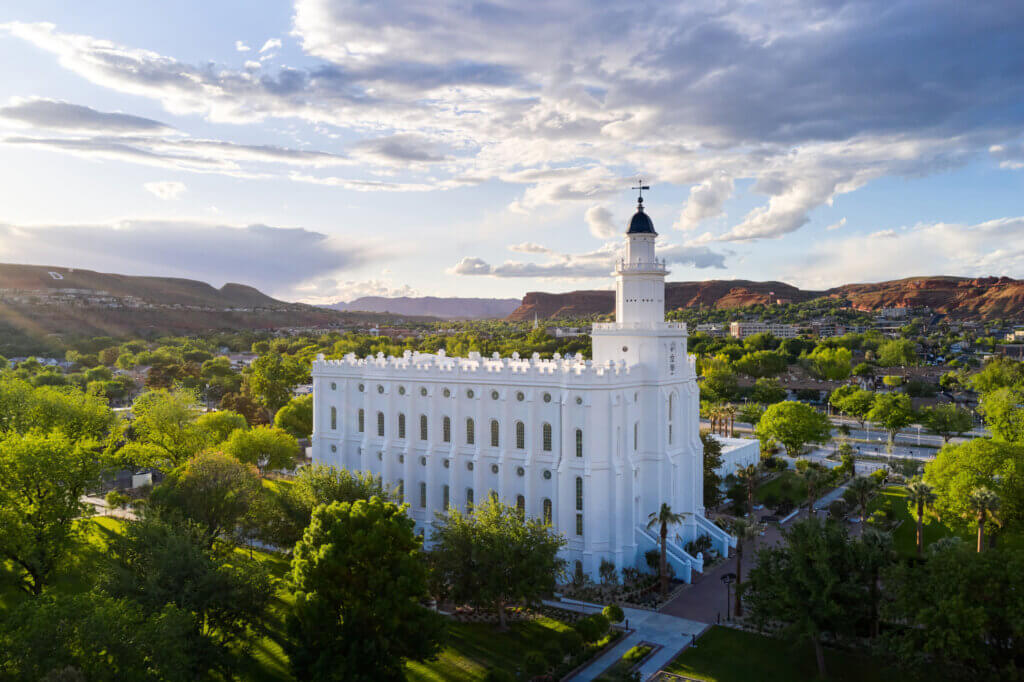Isaiah’s mention of “ordinances” doesn’t leave us wondering very long about which ones he is speaking of. Imagery of temple ordinances appears throughout his book. Says he, “The path of the righteous is straight; you pave an undeviating course for the upright. In the very passage of your ordinances we anticipate you, O Jehovah; the soul’s desire is to contemplate your name. My soul yearns for you in the night; at daybreak my spirit within me seeks after you. For when your ordinances are on the earth, the inhabitants of the world learn righteousness” (Isaiah 26:7–9).
Reading between the lines, and piecing all of Isaiah’s ordinance imagery together, both the examples cited here and those not cited for lack of room, we come up with virtually a complete temple ordinance—that which Latter-day Saints call the “endowment ceremony” which was restored through the prophet Joseph Smith. That temple ordinance extends even to the blessings and curses (or penalties) that were once an integral part of the endowment and which attach to every scriptural covenant the Lord makes with his people and with individuals, past and present.
Here is God’s promise of an eternal lineage for a man and woman resembling his covenant with Abraham: “I will make with them an eternal covenant. Their offspring shall be renowned among the nations, their posterity in the midst of the peoples; all who see them will acknowledge that they are of the lineage Jehovah has blessed. I rejoice exceedingly in Jehovah; my soul delights in my God. For he clothes me in garments of salvation, he arrays me in a robe of righteousness—like a bridegroom dressed in priestly attire, or a bride adorned with her jewels” Isaiah 61:8–10).
Even eunuchs and foreigners aren’t excluded from God’s covenants as he compensates them: “Let not the foreigner who adheres to Jehovah say, Jehovah will surely exclude me from his people. And let not the eunuch say, I am but a barren tree. For thus says Jehovah: As for the eunuchs who keep my Sabbaths and choose to do what I will—holding fast to my covenant—to them I will give a handclasp and a name within the walls of my house that is better than sons and daughters; I will endow them with an everlasting name that shall not be cut off” (Isaiah 56:3–5).
To those who serve as proxy saviors of others on the highest spiritual levels, the Lord promises even the sealing power: “I will invest him with the keys of the house of David: when he opens none shall shut, when he shuts none shall open. I will fasten him as a nail in a sure place, and he will be a throne of glory to the house of his father. Upon him shall be hung all the glory of his father’s house: his descendants and posterity, including all the lesser vessels, from ordinary bowls to the most common containers” (Isaiah 22:22–24). (See “vessels” as souls; Isaiah 66:20).
Contrast these promises of a blessed posterity with the effects of changing sacred ordinances: “The earth lies polluted under its inhabitants: they have transgressed the laws, changed the ordinances, and set at naught the everlasting covenant. The curse devours the earth, for those who dwell on it have incurred guilt; because of it the population of the earth shall be diminished and little of mankind remain” (Isaiah 24:5–6). As the purpose of temple worship is to “see” and “know” Jehovah (Isaiah 1:12; 6:5; 19:19, 21)—who is Jesus—that is possible only on his terms.












